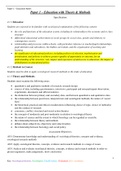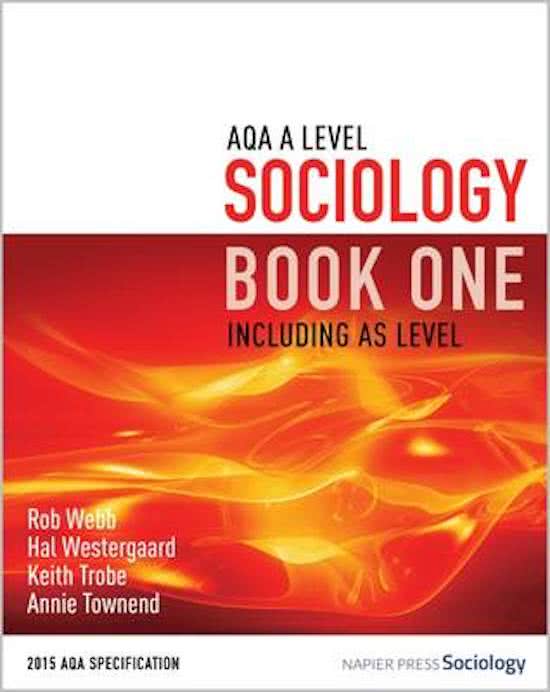Paper 1 – Education Notes
Paper 1 – Education with Theory & Methods
Specification:
4.1.1 Education:
Students are expected to be familiar with sociological explanations of the following content:
• the role and functions of the education system, including its relationship to the economy and to class
structure
• differential educational achievement of social groups by social class, gender and ethnicity in
contemporary society
• relationships and processes within schools, with particular reference to teacher/pupil relationships,
pupil identities and subcultures, the hidden curriculum, and the organisation of teaching and
learning
• the significance of educational policies, including policies of selection, marketisation and
privatisation, and policies to achieve greater equality of opportunity or outcome, for an
understanding of the structure, role, impact and experience of and access to education; the impact of
globalisation on educational policy.
4.1.2 Methods in Context:
Students must be able to apply sociological research methods to the study of education.
4.1.3 Theory and Methods:
Students must examine the following areas:
• quantitative and qualitative methods of research; research design
• sources of data, including questionnaires, interviews, participant and non-participant observation,
experiments, documents and official statistics
• the distinction between primary and secondary data, and between quantitative and qualitative data
• the relationship between positivism, interpretivism and sociological methods; the nature of ‘social
facts’
• the theoretical, practical and ethical considerations influencing choice of topic, choice of method(s)
and the conduct of research
• consensus, conflict, structural and social action theories
• the concepts of modernity and post-modernity in relation to sociological theory
• the nature of science and the extent to which Sociology can be regarded as scientific
• the relationship between theory and methods
• debates about subjectivity, objectivity and value freedom
• the relationship between Sociology and social policy.
Assessment Objectives:
AO1: Demonstrate knowledge and understanding of: sociological theories, concepts and evidence,
sociological research methods
AO2: Apply sociological theories, concepts, evidence and research methods to a range of issues
AO3: Analyse and evaluate sociological theories, concepts, evidence and research methods in order to:
present arguments, make judgements, draw conclusions
1
Key: Sociological theories, Sociologists, Data/Evidence, Evaluation, Key vocabulary.
,Paper 1 – Education Notes
Topic 1 - Class Differences in achievement (1) External factors:
Difference in achievement between pupils from different social classes = comparisons between working-
class & middle-class pupils. Parental occupation determines a pupil’s social class. For example:
➢ Middle-class (non-manual occupations) include professionals such as doctors, teachers & other
‘white collar’ office workers & owners of businesses.
➢ Working-class (manual occupations) include skilled workers such as plumbers, semi-skilled such as
lorry drivers & unskilled such as cleaners.
Explaining class differences:
Social class background has powerful influences on chances of success in the education system. Children
from middle-class families on average perform better than working-class children. Class gap in achievement
grows wider as children get older. Middle-class children do better at GCSE, stay longer in full-time
education & take the great majority of university places.
Popular explanation of class differences in achievement: better-off parents can afford to send their children
to private schools, which provide a higher standard of education. For example, average class sizes are less
than half those in state schools. These schools' education 7% of Britain’s children; they account for half of
all students entering the elite universities of Oxford & Cambridge. According to Sutton Trust (2011), in a 3-
year period, 1 public school alone – Eton – sent 211 pupils to Oxbridge, while over 1,300 state schools sent
no pupils at all to these universities.
Internal & External factors:
Explanations for the existence of class differences in educational achievement:
➢ Internal factors – factors within schools & the education system, such as interactions between pupils
& teachers, & inequalities between schools.
➢ External factors – factors outside the education system, such as the influence of home & family
background, & wider society.
Cultural Deprivation:
Class differences in children’s development & achievement appear early in life. A nationwide study by the
Centre for Longitudinal Studies (2007) found that by the age of 3, children from disadvantaged
backgrounds are already up to 1 year behind those from more privileged backgrounds; the gap widens with
age. Some claim this to be the result of cultural deprivation – most of us begin to acquire the basic values,
attitudes & skills that are needed for educational success through primary socialisation in the family. Basic
‘cultural equipment’ includes language, self-discipline & reasoning skills.
Cultural deprivation theorists – working-class families fail to socialise their children adequately; they grow
up culturally deprived – they lack the cultural equipment needed to do well so they underachieve. There are
3 main aspects of cultural deprivation:
1. Language:
Language – essential part of the process of education & the way parents communicate with their children
affects their cognitive development & their ability to benefit from the process of schooling.
Hubbs-Tait et al (2002) found that where parents use language that challenges their children to evaluate
their own understanding or abilities (what do you think?), cognitive performance improves. Leon Feinstein
(2008) found that educated parents are more likely to use language in this way.
2
Key: Sociological theories, Sociologists, Data/Evidence, Evaluation, Key vocabulary.
,Paper 1 – Education Notes
By contrast, less educated parents tend to use language in ways that require children to make simple
descriptive statements (what’s that animal called?); this results in lower performance.
Feinstein found that educated parents are more likely to use praise which encourages their children to
develop a sense of their own competence.
Cultural deprivation theorists see these differences in how parents use language as linked to social class.
Carl Bereiter & Siegfried Engelmann (1966) claim that the language used in lower-class homes is deficient;
they describe lower-class families as communicating by gestures, single words or disjointed phrases. As a
result, their children fail to develop the necessary language skills; they grow up incapable of abstract
thinking & unable to use language to explain, describe, enquire or compare. Due to this, they are unable to
take advantage of the opportunities school offers.
Speech codes:
Basil Bernstein (1975) identifies differences between working-class & middle-class language that influence
achievement. He distinguishes between 2 types of speech code:
➢ The restricted code – used by working class. Limited vocabulary; based on the use of short, often
unfinished, grammatically simple sentences. Speech is predictable & may involve only a single word
or even a gesture instead. It is descriptive not analytic. The restricted code is context-bound:
speaker assumes that the listener shares the same set of experiences.
➢ The elaborated code – used by middle class. Wider vocabulary; based on longer, grammatically
complex sentences. Speech is more varied & communicates abstract ideas. Elaborated code is
context-free: speaker does not assume that the listener shares the same experiences & so they use
language to spell out their meanings explicitly for the listener.
Differences in speech code give middle-class children an advantage at school & put working-class children
at a disadvantage. Elaborated code is the language used by teachers, textbooks & exams; it is taken as the
‘correct’ way to speak & write. In Bernstein’s view, it is also a more effective tool for analysing, reasoning &
expressing thoughts clearly – essential skills in education.
Early socialisation into the elaborated code means that middle-class children are fluent users of the code
when they start school. They feel ‘at home’ in school & are more likely to succeed. Working-class children
lack the code in which schooling takes place – they are likely to feel excluded & to be less successful.
Critics argue that Bernstein is a cultural deprivation theorist – he describes working-class speech as
inadequate. Unlike most cultural deprivation theorists, Bernstein recognises that the school (and not just the
home) influences children’s achievement. He argues that working-class pupils fail not because they are
culturally deprived, but because schools fail to teach them how to use the elaborated code.
2. Parents’ education:
Cultural deprivation theorists argue that parents’ attitudes to education are a key factor affecting children’s
achievement. For example, a major early study by Douglas (1964) found that working-class parents placed
less value on education. As a result, they were less ambitious for their children, gave them less
encouragement & took less interest in their education. They visited schools less often & were less likely to
discuss their children’s progress with teachers; their children had lower levels of motivation & achievement.
Leon Feinstein (2008) reaches similar conclusions. He argues that parents’ own education is the most
important factor affecting children’s achievement. Since middle-class parents tend to be better educated,
they can give their children an advantage by how they socialise them. This occurs in several ways:
➢ Parenting style:
3
Key: Sociological theories, Sociologists, Data/Evidence, Evaluation, Key vocabulary.
, Paper 1 – Education Notes
Educated parents’ parenting style emphasises consistent discipline & high expectations of their children;
this supports achievement by encouraging active learning & exploration. Less educated parents’ parenting
style is marked by harsh, inconsistent discipline; this prevents the child from learning independence & self-
control, leading to poorer motivation at school & problems interacting with teachers.
➢ Parents’ educational behaviours:
Educated parents are more aware of what is needed to assist their children’s educational progress. They
are better able to get expert advice on childrearing, more successful in establishing good relationships with
teachers & better at guiding their children’s interactions with school. These parents also recognise the
educational value of activities such as visits to museums/libraries.
➢ Use of income:
Better educated parents tend to have higher incomes & spend their income to promote their children’s
educational success. As Bernstein & Young (1967) found, middle-class mothers are more likely to buy
educational toys, books & activities that encourage reasoning skills & stimulate intellectual development.
Working-class homes are more likely to lack these resources; this means children from such homes start
school without the intellectual skills needed to progress.
Educated parents have a better understanding of nutrition & its importance in child development & a higher
income – used to buy more nutritious food.
➢ Class, income & parental education:
While better-paid, middle-class parents tend to be better educated than lower-paid, working-class parents,
Feinstein notes that parental education has an influence on children’s achievement, regardless of class or
income. Even within a given social class, better educated parents tend to have children who are more
successful at school. This explains why not all children of working-class parents do equally badly & why not
all children from middle-class families are equally successful.
3. Working-class subculture:
Cultural deprivation theorists argue that lack of parental interest in their children’s education reflects the
subcultural values of the working class. A subculture is a group whose attitudes & values differ from those
of the mainstream culture. According to cultural deprivation theorists, large sections of the working class
have different goals, beliefs, attitudes & values from the rest of society; therefore, their children fail at
school.
Barry Sugarman (1970) argues that working-class subculture has four key features that act as a barrier to
educational achievement:
➢ Fatalism: belief in fate - ‘whatever will be, will be’ & there is nothing you can do to change your
status. This contrasts with middle-class values, which emphasise that you can change your position
through your own efforts.
➢ Collectivism: valuing being part of a group more than succeeding as an individual. This contrasts
with the middle-class view that an individual should not be held back by group loyalties.
➢ Immediate gratification: seeking pleasure now rather than making sacrifices in order to get rewards
in the future. Middle-class values emphasise deferred gratification, making sacrifices now for greater
rewards later.
➢ Present-time orientation: seeing the present as more important than the future; not having long-term
goals. Middle-class culture has a future-time orientation that sees planning as important.
Working-class children internalise the beliefs & values of their subculture through the socialisation process;
this results in them underachieving at school.
4
Key: Sociological theories, Sociologists, Data/Evidence, Evaluation, Key vocabulary.





